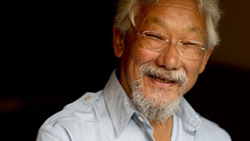International conference explores concept of degrowth
We are often told that growth is good; that it is something to strive for. Nations constantly endeavour to grow their economies, and in the corporate world, scale is certainly rewarded. But is growth really a worthy aim?

Increased consumption and overpopulation are testing the limits of the world’s natural resources. When should we stop growing? Or, perhaps more importantly, how might we stop growing?
From May 13 to 19, Concordia is hosting, along with HEC Montréal, McGill, Université de Montreal and UQÀM, an international conference that will bring together academics, activists, environmentalists and indigenous peoples to discuss issues related to the concept of degrowth.
The conference, aptly titled Degrowth in the Americas, is the first of its kind to take place outside of Europe and will focus on matters particular to North, Central and South America.
“Growth has traditionally been seen as a universally good thing, but given the finite nature of our resources, it is unsustainable. We have to learn to degrow,” says Andrew Ross, who is a program coordinator at the John Molson School of Business David O’Brien Centre for Sustainable Enterprise, and one of the conference organizers.
“The modern notion of convivial degrowth has been around since the 1970s and involves changing our daily habits, embracing moderation and re-examining what it is that we value.”
The upcoming conference was conceived by the organizers as a forum for discussing how we can build diverse and equitable societies on a planet that cannot sustain the current industrial model nor its social and cultural framework.
The event, which is expected to attract as many as 500 attendees, has six themes: grounding, knowing, relating, consenting, sharing and experiencing. Activities related to these themes will be offered throughout the campuses of the participating universities, and will include lectures, panel discussions and film screenings, as well as art, video and cultural exhibits. Various social movements and groups focused on alternative food, housing and cooperative initiatives will also be represented.

The conference schedule features sections of each day earmarked for what organizers call nothing time. “We’ve heard again and again that time is money. It shouldn’t be,” explains Ross. “Most of the time in our schedules is filled. It is no longer available. Nothing time is about taking some of it back. Doing nothing means taking time for reflection, observation and contemplation. Doing nothing is also environmentally-friendly as it requires no resources at all.”
Among the many lecturers participating in the conference is Dr. David Suzuki, who is widely regarded as a world leader in sustainable ecology. His talk, entitled Humanity in Collision with the Biosphere: Is it Too Late?, is scheduled for Friday, May 18. Watch NOW for confirmed event information.
The conference opens at Concordia on Sunday, May 13.
Related links:
• Degrowth in the Americas
• David O’Brien Centre for Sustainable Enterprise

